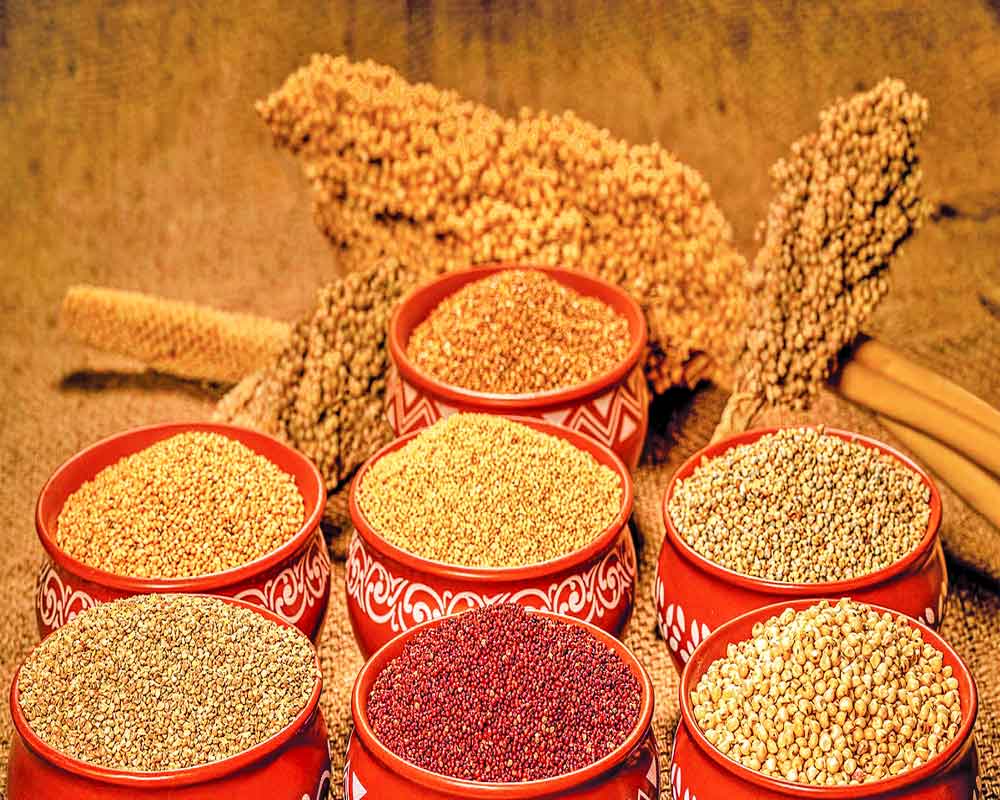They help us fight problems of malnutrition, obesity
Millets were a major crop consumed in India and numerous other nations till about five decades ago. According to a 2014 National Council of Applied Economic Research (NCAER) report, the plate share of millets has declined significantly in favour of wheat, rice, and processed foods.
As a result of increased land being used for wheat and rice production, the cultivation area for millets has decreased by 58 per cent for small millets, 64 per cent for sorghum, 49 per cent for finger millet, and 23 per cent for pearl millet since 1956. Millets are considered to be the sole crop that can handle critical challenges in the future such as food, fuel, malnutrition, health, and climate change.
With India’s growing malnutrition problem—both under-nutrition (vitamin, mineral, and protein deficiencies) and over-nutrition (obesity, metabolic syndrome, and lifestyle diseases)—there is a growing awareness of the need to move to healthier, more accessible, and inexpensive diets that include millets. In addition to being naturally gluten-free and nutrient-dense, millets are also a rich source of protein, essential fatty acids, dietary fibre, and vitamin B.
When it comes to the global scenario of millet production, India is the top producer of millets in the world and the fifth-largest exporter of millets globally. As the demand for millets rises quickly, their exports are expanding dramatically. More business opportunities are being created for entrepreneurs as millets’ demand rises.
The millet market has a value of over $9 billion in 2018, and is expected to grow at a rate of over 4.5 per cent from 2018 to 2025, with a value projection of over $12 billion.
Apart from creating business opportunities, millets also aid in the prevention of numerous non-communicable lifestyle diseases such as diabetes, hypertension, and cardiovascular disease, and are considered to be a potential choice or solution to lessen the negative effects of rising malnutrition and to improve the food and nutrition security of the nation.
Due to their adaptability to a wide range of temperatures and moisture regimes as well as their low input requirements, millets are resistant to climate change. They are resilient crops with small water and carbon footprints.
Millets can withstand droughts and can even survive on 350-400 mm of rain, making them an ideal crop for production.
As proposed by India to the Food and Agriculture Organization, the United Nations General Assembly adopted a resolution declaring 2023 as the International Year of Millets. The main goal of this initiative is to raise public awareness of the health benefits of millets and their suitability for cultivation under challenging conditions brought on by climate change.
The International Year of Millet provides an excellent chance to:
1. improve millets’ contribution to food security
2. increase millet output globally
3. make sure that the processing, transport, storage, and consumption are efficient
4. and sustainable millet production and quality with stakeholder participation
Millet farming is still an area with a lot of room for ecosystem-level interventions. Promoting millets not only raises awareness of these wonder crops, but also of women farmers and their farming knowledge.
Raising awareness among farmers and the general public about the numerous benefits of millets can help to revitalise millets production and consumption in India.
(The author is Founder and MD, Gudmom by 1Organic, and Millet Evangelist)


























